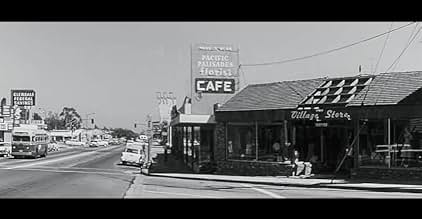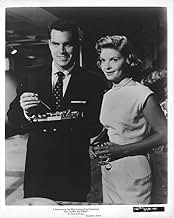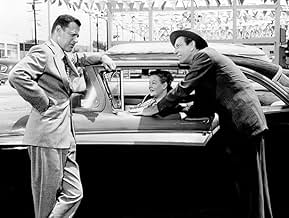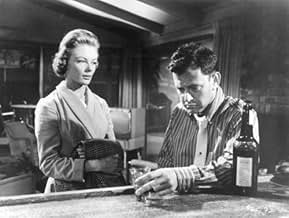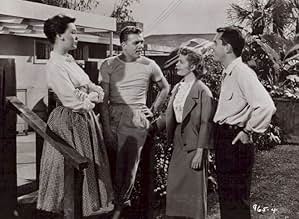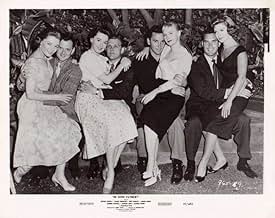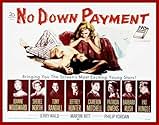IMDb RATING
7.1/10
1.4K
YOUR RATING
In California, four couples who have bought houses near one another face problems, alcoholism, racism, promiscuity, and discrimination against lack of education, until a tragic event forces ... Read allIn California, four couples who have bought houses near one another face problems, alcoholism, racism, promiscuity, and discrimination against lack of education, until a tragic event forces them to reassess their lives.In California, four couples who have bought houses near one another face problems, alcoholism, racism, promiscuity, and discrimination against lack of education, until a tragic event forces them to reassess their lives.
- Director
- Writers
- Stars
- Nominated for 2 BAFTA Awards
- 1 win & 2 nominations total
Robert H. Harris
- Markham
- (as Robert Harris)
Robert Burton
- Mr. Cagle
- (uncredited)
Mary Carroll
- Mrs. Burnett
- (uncredited)
George Chester
- Car Attendant
- (uncredited)
Heinie Conklin
- Church Member
- (uncredited)
Frank Gerstle
- Verdun
- (uncredited)
Mimi Gibson
- Sandra Kreitzer
- (uncredited)
Charles Herbert
- Michael Flagg
- (uncredited)
- Director
- Writers
- All cast & crew
- Production, box office & more at IMDbPro
Featured reviews
The script is sharp and at times, poignant, the acting is superb, and the overall impact is overwhelming. It peels the label off of the seemingly happy suburban couples and, in so doing, provides the sharpest snapshot ever put to film about a time and place that no longer exists, the one that was written about by such giants as Updike and Cheever. The only problem with this movie is that it's only shown on TV about once every ten years and it's not available on video. One last comment. After watching this movie, you'll never look at Tony Randall in the same way.
The performances of Pat Hingle and Barbara Rush seem very modern to me. When he washes the car while the rest of the community goes to church, she gently admonishes him for not going to church, but conveys to the audience that this has long been a point of contention between them, and that she understands his reasons - just as he understands her desire to have him attend church. However, like any intelligent wife, she doesn't go over old ground; she simply suggests a compromise. She negotiates with him quickly and easily by suggesting that he wash the car after church from now on. He easily agrees, and the matter is settled. In at least three other scenes,they're shown disagreeing about various issues - however, they do it calmly and maturely, and with a healthy dose of humor.
One scene explains, with charm, that they are simpatico in the bedroom, too. She doesn't make him bust his chops wooing her, and she doesn't pretend that she isn't interested, like good little 1950's girls were supposed to do,
Most moving is a scene in which they have their worst disagreement, and both actors effectively evoke their unhappiness about not being on the same page. One senses that this couple is very close, and that they derive strength from their partnership. After this worst disagreement, they attend a party at which Pat Hingle approaches his wife in a tender way, and asks her to dance. She agrees immediately, and in the following scenes, we see them dancing happily, and exchanging reassuring looks.
I think this couple's marriage depicts a healthy relationship. They're always ready to calmly discuss things, to hear each other out, and be fair. Their goal in any discussion seems to be reaching a fair agreement, and getting back to being good friends, as well as lovers.
In my opinion, Pat Hingle helms this movie. The other characters seem dated. For example, Hingle is the only one who jumps up to call the police after a crime has been committed; Hingle is the only one who is sensibly, not insanely, ambitious; Hingle is the only one who doesn't seem interested in other women; Hingle is the only one who considers his wife a partner, and values her opinion; Hingle is the one who is physically affectionate with his children; and most importantly, Hingle is the one who raises questions about racism and intellectual bigotry. And thanks to the script, he isn't a crusader. He is a man who is open-minded enough to contemplate these issues as they are presented to him, and to question the passive bigotry that he comes to realize has been ingrained in him by his family and country.
Hingle and Rush's characters ring true, and are beautifully portrayed by the actors. The other characters are broadly-drawn, one dimensional, and have not aged well.
One scene explains, with charm, that they are simpatico in the bedroom, too. She doesn't make him bust his chops wooing her, and she doesn't pretend that she isn't interested, like good little 1950's girls were supposed to do,
Most moving is a scene in which they have their worst disagreement, and both actors effectively evoke their unhappiness about not being on the same page. One senses that this couple is very close, and that they derive strength from their partnership. After this worst disagreement, they attend a party at which Pat Hingle approaches his wife in a tender way, and asks her to dance. She agrees immediately, and in the following scenes, we see them dancing happily, and exchanging reassuring looks.
I think this couple's marriage depicts a healthy relationship. They're always ready to calmly discuss things, to hear each other out, and be fair. Their goal in any discussion seems to be reaching a fair agreement, and getting back to being good friends, as well as lovers.
In my opinion, Pat Hingle helms this movie. The other characters seem dated. For example, Hingle is the only one who jumps up to call the police after a crime has been committed; Hingle is the only one who is sensibly, not insanely, ambitious; Hingle is the only one who doesn't seem interested in other women; Hingle is the only one who considers his wife a partner, and values her opinion; Hingle is the one who is physically affectionate with his children; and most importantly, Hingle is the one who raises questions about racism and intellectual bigotry. And thanks to the script, he isn't a crusader. He is a man who is open-minded enough to contemplate these issues as they are presented to him, and to question the passive bigotry that he comes to realize has been ingrained in him by his family and country.
Hingle and Rush's characters ring true, and are beautifully portrayed by the actors. The other characters are broadly-drawn, one dimensional, and have not aged well.
8Pyat
This is not the sort of movie, I usually like. It's basically a soap opera about of the lives of 4 young married couples in a new community in California. What makes it stand out is the truly amazing performances of the actors - Oscar material, certainly. It's well worth the rental, if you can find it. Occasionally shown at 2am on access cable, this is a hidden gem.
I caught this movie at a film festival at UCLA this week-end. It was excellent. Great screen play and acting. I almost didn't recognize Tony Randall as his nose is suspiciously larger than it seems in later films. Unlike the reviewer who felt this was essentially a "Soap Opera" that was well acted, I think that this film had an obvious dark side. It wasn't just the telling of the business of others, it was the unveiling of the dark underbelly of suburban life. Not for the sake of entertainment, but for the sake of exposure. This movie reminded me a lot of a William Inge play. An expose more-so than a side show. I loved it much more than I expected to.
This 20th Century Fox expose of "the good life" in the suburbs wasn't seen by anybody much in 1957, and it's easy to see why: It probes convincingly deep into the less pleasant aspects of this clean, all-white subculture, and suburban moviegoers probably didn't want to see their worst aspects on screen, and urban audiences didn't care. Early Martin Ritt, and typically thorough of him, it explores prejudice, sexism, alcoholism, war veterans with what would now be diagnosed as PTSD, and capitalism's way of trapping young families in debt. The wide-screen black-and-white cinematography is clean and alluring, and all eight principals do well--Sheree North, groomed by 20th to be a threat to Monroe, proves once again that they didn't really give her enough chances to show what she could do. The shiny surfaces and flattering clothes and powerful cars all illustrate that "good life," and show what's wrong with it. And in comprehensively exploring the roots and hypocrisies and effects of racism at the time, it's a good deal braver than many contemporary films.
Did you know
- TriviaOf Joanne Woodward's films, this is her personal favorite.
- Quotes
Jerry Flagg: I couldn't come home. I was feeling so punk.
- ConnectionsFeatured in Sex at 24 Frames Per Second (2003)
- SoundtracksThe Drive-In Rock
(uncredited)
Music by Lionel Newman
Lyrics by Carroll Coates
[The song first played and danced to at the Flaggs' dinner party, then played later when Troy rushes home after finding out about the Police Chief job]
- How long is No Down Payment?Powered by Alexa
Details
- Release date
- Country of origin
- Language
- Also known as
- No Down Payment
- Filming locations
- 15281 W. Sunset Blvd., Pacific Palisades, Los Angeles, California, USA(Troy Boone's Mobil gas station)
- Production companies
- See more company credits at IMDbPro
Box office
- Budget
- $995,000 (estimated)
- Runtime
- 1h 45m(105 min)
- Color
- Aspect ratio
- 2.35 : 1
Contribute to this page
Suggest an edit or add missing content

